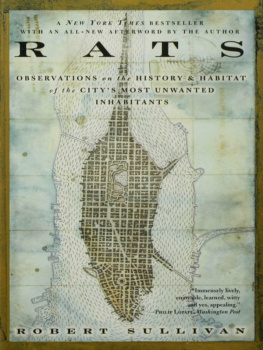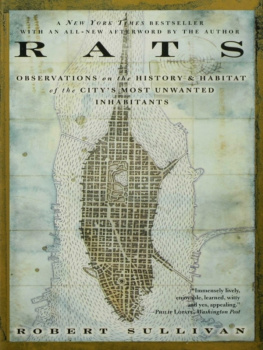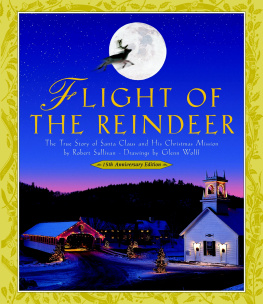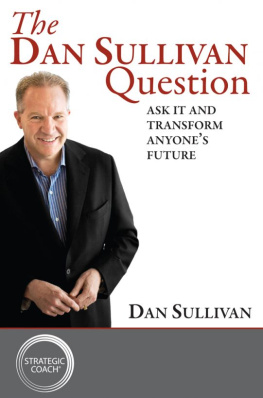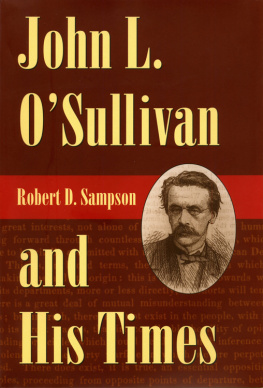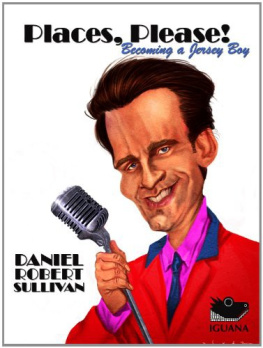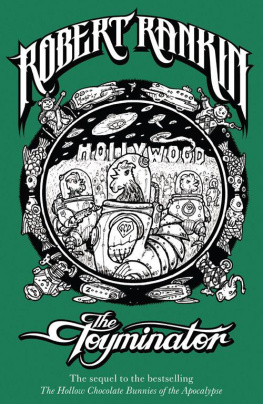Robert Sullivan - Rats: Observations on the History and Habitat of the Citys Most Unwanted Inhabitants
Here you can read online Robert Sullivan - Rats: Observations on the History and Habitat of the Citys Most Unwanted Inhabitants full text of the book (entire story) in english for free. Download pdf and epub, get meaning, cover and reviews about this ebook. year: 2004, publisher: Bloomsbury USA, genre: Art. Description of the work, (preface) as well as reviews are available. Best literature library LitArk.com created for fans of good reading and offers a wide selection of genres:
Romance novel
Science fiction
Adventure
Detective
Science
History
Home and family
Prose
Art
Politics
Computer
Non-fiction
Religion
Business
Children
Humor
Choose a favorite category and find really read worthwhile books. Enjoy immersion in the world of imagination, feel the emotions of the characters or learn something new for yourself, make an fascinating discovery.
- Book:Rats: Observations on the History and Habitat of the Citys Most Unwanted Inhabitants
- Author:
- Publisher:Bloomsbury USA
- Genre:
- Year:2004
- Rating:5 / 5
- Favourites:Add to favourites
- Your mark:
- 100
- 1
- 2
- 3
- 4
- 5
Rats: Observations on the History and Habitat of the Citys Most Unwanted Inhabitants: summary, description and annotation
We offer to read an annotation, description, summary or preface (depends on what the author of the book "Rats: Observations on the History and Habitat of the Citys Most Unwanted Inhabitants" wrote himself). If you haven't found the necessary information about the book — write in the comments, we will try to find it.
Rats: Observations on the History and Habitat of the Citys Most Unwanted Inhabitants — read online for free the complete book (whole text) full work
Below is the text of the book, divided by pages. System saving the place of the last page read, allows you to conveniently read the book "Rats: Observations on the History and Habitat of the Citys Most Unwanted Inhabitants" online for free, without having to search again every time where you left off. Put a bookmark, and you can go to the page where you finished reading at any time.
Font size:
Interval:
Bookmark:
Acclaim for Rats
"This is a wonderful book about the despised creatures with whom New Yorkers share their city. Rats have been hunted down here for centuries, but remain unvanquished. As Mr. Sullivan reminds usin detailed, graceful prosethey are as much part of the city's history as any part of its human alloy. One thing is certain: after reading this book you will understand much more about that history, and never look at a rat in the same way again." Pete Hamill, author of Forever and A Drinking Life
"Eloquent.''Entertainment Weekly
"Rats is a sort of bizarro-Walden, an exercise in really knowing one small, unremarkable and, in this case, revolting plot of ground. In Sullivan's mirror Walden it's the rats, not the people, who live lives of quiet desperation, 'hiding beneath the table of man, under stress, skittering in fear.' "Newsday
"Sullivan leavens his systemic study with anecdotal digressions, approaching his fleet-footed, fast-food-loving quarry with a naturalist's curiosity and a storyteller's fluency."New York magazine
"Rats is a must-read. Don't let this book scurry out of your sight." San Antonio Express
"Hugely entertaining."Village Voice
"Sullivan takes us deeper into the world of rats than most of us, left to ourselves, would be willing to go."Dallas Morning News
"Rats will both entertain and edify you about a part of the world you never thought much about."Chicago Sun-Times
"Who knew a book about one of nature's most reviled creatures could make such great bedside reading? I thoroughly enjoyed this historical chronicle of rodents in New York City. It's not only a history of rats, but it is also a social history of the city."Book Sense
"Sullivan beguiles us with remarkable tales about an inexhaustible topic."Playboy
"[A] sublime book."Wired
"Rats might generate sympathy for a truce in the longstanding war between rats and the human civilization they mimic."Colorado Reporter-Herald
"Skittering, scurrying, terrific natural history."Kirkus Reviews, starred review
"This book is a must pickup for every city dweller, even if you'll feel like you need to wash your hands when you put it down." Publishers Weekly, starred review
RATS
BY THE SAME AUTHOR
The Meadowlands
A Whale Hunt
RATS
Observations on the History and Habitat
of the City's Most Unwanted Inhabitants
ROBERT SULLIVAN
BLOOMSBURY
Copyright 2004 by Robert Sullivan
All rights reserved. No part of this book may be used or reproduced in any manner whatsoever without written permission from the publisher except in the case of brief quotations embodied in critical articles or reviews. For information address Bloomsbury Publishing, 175 Fifth Avenue, New York, NY 10010.
Published by Bloomsbury Publishing, New York and London Distributed to the trade by Holtzbrinck Publishers
All papers used by Bloomsbury Publishing are natural, recyclable products made from wood grown in well-managed forests. The manufacturing processes conform to the environmental regulations of the country of origin.
The Library of Congress has cataloged the hardcover edition as follows:
Sullivan, Robert, 1963
Rats : observations on the history and habitat of the city's most unwanted inhabitants / Robert Sullivan.1st U.S. ed.
p. cm.
eISBN: 978-1-58234-477-5
1. RatsNew York (State)New YorkAnecdotes. 2. Urban pestsNew York (State)New YorkAnecdotes. 3. Sullivan, Robert, 1963- I. Title.
QL795.R2S85 2003
599.35'21756dc22
2003016293
First published in the United States by Bloomsbury Publishing in 2004
This paperback edition published in 2005
7 9 10 8 6
Typeset by Hewer Text Ltd, Edinburgh
Printed in the United States of America
by Quebecor World Fairfield
For Suzanne
CONTENTS
You always have to think beyond the structure. Think about what is going on underneath and all around, because that is where the rats are located. The more you look into it, the more you will most likely find.
John Murphy, an exterminator, in
Pest Control Technology magazine
I think his fancy for referring everything to the meridian of Concord did not grow out of any ignorance or depreciation of other longitudes or latitudes, but was rather a playful expression of his conviction of the indifferency of all places, and that the best place for each is where he stands. He expressed it once in this wise: "I think nothing is to be hoped from you, if this bit of mould under your feet is not sweeter to you to eat than any other in this world, or in any world."
Ralph Waldo Emerson, in a
remembrance of Henry David Thoreau *'
It avails not, time nor placedistance avails not,
I am with you, you men and women of a
Generation, or ever so many generations hence,
Just as you feel when you look on the river and sky, so I felt, Just as any of you is one of a living crowd, I was one of a crowd...
Walt Whitman, "Crossing Brooklyn Ferry"
NATURE
W HEN I WROTE the following account of my experiences with rats, I lived in an apartment building on a block filled with other apartment buildings, amidst the approximately eight million people in New York City, and I paid rent to a landlord that I never actually metthough I did meet the superintendent, who was a very nice guy. At this moment, I am living out of the city, away from the masses, in a bucolic little village with about the same number of inhabitants as my former city block. I wouldn't normally delve into my own personal matters, except that when I mention my rat experiences to people, they sometimes think I took extraordinary measures to investigate them, and I didn't. All I did was stand in an alleya filth-slicked little alley that is about as old as the city and secret the way alleys are secret and yet just a block or two from Wall Street, from Broadway, and from what used to be the World Trade Center. All I did was take a spot next to the trash and wait and watch, rain or no rain, night after night, and always at night, the time when, generally speaking, humans go to sleep and rats come alive.
Why rats? Why rats in an alley? Why anything at all in a place that is, let's face it, so disgusting? One answer is proximity. Rats live in the world precisely where man lives, which is, needless to say, where I live. Rats have conquered every continent that humans have conquered, mostly with the humans' aid, and the not-so-epic-seeming story of rats is close to one version of the epic story of man: when they arrive as immigrants to a newfound land, rats push out the creatures that have preceded them, multiply to such an extent as to stretch resources to the limit, consume their way toward faminea point at which they decline, until, once again, they are forced to fight, wander, or die. Rats live in man's parallel universe, surviving on the effluvia of human society; they eat our garbage. I think of rats as our mirror species, reversed but similar, thriving or suffering in the very cities where we do the same. If the presence of a grizzly bear is the indicator of the wildness of an area, the range of unsettled habitat, then a rat is an indicator of the presence of man. And yet, despite their situation, rats are ignored or destroyed but rarely studied, disparaged but never described.
I see that I am like one person out alone in the woods when it comes to searching out the sublime as it applies to the rat in the city. Among my guidebooks to nature, there is no mention of the wild rat, and if there is, the humans that write the books call them invaders, despised, abhorred, disgustinga creature that does not merit its own coffee-table book. Here is the author of a beautiful collection of photographs and prose joyously celebrating the mammals of North America as he writes about rats: "There comes a time when even the most energetic of animal lovers must part ways with the animal kingdom." He goes on: "No matter how much you like animals there is
Next pageFont size:
Interval:
Bookmark:
Similar books «Rats: Observations on the History and Habitat of the Citys Most Unwanted Inhabitants»
Look at similar books to Rats: Observations on the History and Habitat of the Citys Most Unwanted Inhabitants. We have selected literature similar in name and meaning in the hope of providing readers with more options to find new, interesting, not yet read works.
Discussion, reviews of the book Rats: Observations on the History and Habitat of the Citys Most Unwanted Inhabitants and just readers' own opinions. Leave your comments, write what you think about the work, its meaning or the main characters. Specify what exactly you liked and what you didn't like, and why you think so.

